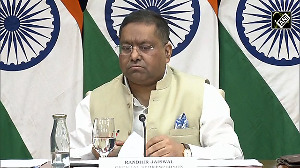To the world, Indian business process outsourcing may have come of age but the industry itself is taking cognizance of a number of issues that need to be resolved to keep customers home and competition at bay. Business Standard spoke to a cross section of BPO majors to check their main concerns and the road ahead. Extracts:
Consolidation
With two acquisition deals worth Rs 1,250 crore (Rs 12.50 billion) involving global giants IBM and Citigroup being struck in a week, India's status as the offshoring hotspot was recently reconfirmed.
But the acquisitions also mark the beginning of a new phase of mergers and acquisitions in the still-evolving BPO industry.
"This is a business of deep pockets, if you can't scale up you have to go out of business. There will be consolidation both at the front end and at the back. Eventually there will 2-3 big players in each segment," said Raman Kumar, CEO of CBay Systems.
Does this mean that small Indian third-party vendors will live under the perennial fear of getting rolled over by multinationals or large Indian vendors who are constantly on the prowl?
Neeraj Bhargava, group CEO, WNS said: "Everybody can co-exist in this set-up. There is no precedent in the world where independent companies could not sustain themselves because there were bigger companies in the fray. But it will be a big challenge for companies that employ less than 2000 people and can't scale up as per requirements."
The general feeling is that the industry is up for a large-scale consolidation in 12-18 months with both MNCs and the bigger Indian third party BPOs bringing the smaller companies into their fold.
Challenges
Though BPO players are not overly bothered by external threats such as competition from China or Philippines or the United States-led backlash against outsourcing it is increasingly taking stock of stumbling blocks within the organisation.
"The single biggest issue is managing people. If you want to recruit 70,000 people you have to scan 2.5 million for that, the question is where do you find these people? In a situation where scalability is everything you have to have the necessary human resource at hand," said Asheesh Gupta, president, Hero Mindmine.
On the HR front, Randy Harris, COO of SITEL Corporation, puts the spotlight on the need for training in the industry "Although there is huge number of English speaking people, the level of English spoken is not good enough.
Also Americans (clients) are not very tolerant of different accents. Therefore there is a need to create a larger labour pool through adequate training."
There are other areas too. "Risk mitigation is another important issue. The client comes to you with concerns like data security and data privacy and you have to give them that comfort factor," said Ravi S Ramakrishnan, CEO and consultant RvaluE Consulting.
Indian companies, which were considered to be at the pinnacle of excellence, have started to lose clients because of quality lapses.
The rising rupee
The rising rupee has been a much discussed issue both in IT and the BPO sectors as players see their cost arbitrage getting eroded as the rupee marches ahead unchallenged. In spite of all the emphasis on quality and security, cost still tops an offshorer list of priorities.
"It's happening. We can see BPOs losing their cost arbitrage. It's time the government stepped in and to help the industry by regulating the rupee instead of waiting for it to dip to the Rs 40 level. If that happens, there will be a shakeout in the industry," said Gopal Jain, regional vice president of the Indo-American Chamber of Commerce.
"Player with deep pockets can sustain even with lower margins. If the rupee rise continues to affect the margins, companies will have to increase their productivity and expertise so that they are able to command a better price," said Prabhuu Sinha, senior vice-president and global head quality consulting, Satyam Computer Services.
The road ahead
There is consensus on this one: India has to move up the value chain. The coming years will be an era of verticalisation or domain expertise where the 'me toos' will find it a tough going.
"Even a call centre or a medical transcription company will have to find itself that differentiator to keep customers. Everything will depend on how much value you can add to what every body else is offering," said Lathika Pai, COO, B2K Corp.
Banking, insurance, healthcare and retail are touted to be the hottest BPO destination.







 © 2025
© 2025